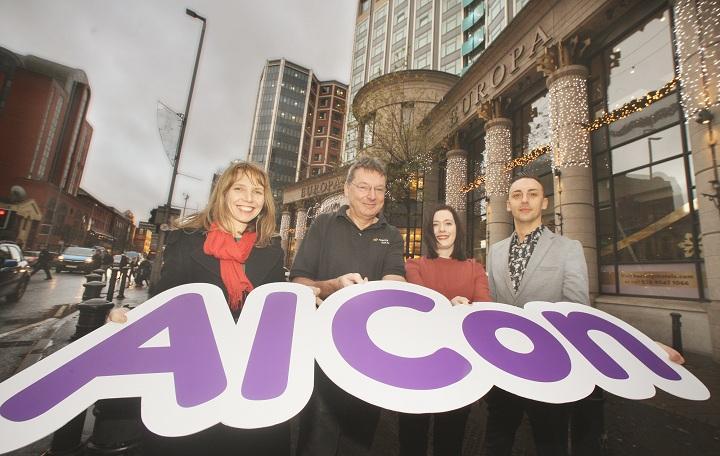
It’s been a week since Belfast’s inaugural AI Con took place at the Europa hotel, where the 400-strong audience heard from various experts throughout the day on how AI is changing the world and thriving in Northern Ireland.
Seedcamp venture partner, Stephen Allot spoke in the early morning of the use and misuse of AI.
Mr Allott focused on how artificial intelligence is used for personalisation, addiction and propaganda. One of the main topics he touched on was the prominent point of social media addiction in the modern world.
“Social media companies are deliberately addicting users to their products for financial gain, Silicon Valley insiders have told the BBC’s Panorama Programme,” he said. He showed video footage of ex-social media platform employees and software specialists that explained the issue further.
“It’s as if they’re taking behavioural cocaine and just sprinkling it all over your interface and that’s the thing that keeps you coming back and back and back,” said former Mozilla and Jawbone employee, Aza Raskin.“Behind every screen on your phone, there are generally like literally a thousand engineers that have worked on this thing to make it maximally addicting,” he added.
In 2006 Mr Raskin, a leading technology engineer himself, designed infinite scroll, one of the features of many apps that is now seen to be as highly habit forming. At the time he was working for Humanized - a computer user interface consultancy.
RELATED: AI Con: the original story
Mr Allott also discussed the fact that “computational propaganda is widespread”, referring to the book, “Computational Propaganda” that is based upon a series of case studies in a number of countries between 2015 and 2017. The book includes qualitative and quantitative analysis of how tools like social media bots are used to manipulate public opinion, also touching on how various political parties worldwide use social media to subtly spread disinformation, hate speech and junk news.
Some information that came from the book and Mr Allott’s presentation are as follows:

Following Mr Allott, Dr Anna Jurek from Queen’s University, Belfast (QUB) informed the audience of how the university’s School of Electronics, Electrical Engineering and Computer Science is using data science and “emotional analysis” to detect ‘fake news’ – an epidemic sweeping the globe since mid-2016 when most popularly discussed during the US presidential election.
QUB is taking an evidence based medicine approach to medical facts verification (as medical fake news threatens our health), and is assessing the coherence of political news using topic modelling, amongst other initiatives.
RELATED: AI Con: NI could be Centre of Excellence in artificial intelligence
Despite these negative connotations, AI Con showed that to simply view the tech in this way would be counter-productive, as AI opens up so many more opportunities than problems. It is creating new careers, as explained by Adrian Johnston, director at Digital Catapult Northern Ireland. He said that the jobs children now will have in 10 years probably haven’t been invented yet, and that it is a myth that AI and emerging tech is driving unemployment. Web developers, UX designers and software engineers are only a few examples of top-grade careers that AI has helped create in recent years, and due to a current skills shortage for these jobs in NI, the pay for these roles is substantially higher.
Mr Johnston also detailed some shocking statistics, such as how every two years as much information is created as there is from the dawn of civilisation to 2003. He noted that AI is enabling data growth, innovation and disruption, and is not just for large, expensive corporations.
With a thriving AI community now in Northern Ireland, that is still increasing as the country’s first AI-dedicated conference has shown, it is hard to imagine a current or future world where artificial intelligence won’t be at the heart of all businesses.